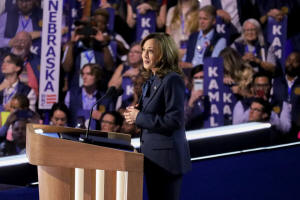Illinois’ presidential electors to meet Tuesday to cast votes for Harris
 Send a link to a friend
Send a link to a friend
 [December 17, 2024]
By Peter Hancock [December 17, 2024]
By Peter Hancock
SPRINGFIELD – Illinois’ presidential electors will meet at the
Statehouse on Tuesday to cast their votes for president and vice
president of the United States.
The ceremony, which is held on the same day in all 50 states and
Washington, D.C., is one of the final steps in certifying the winner of
the presidential election. The process is spelled out in federal law and
the U.S. Constitution.
“A successful election is defined by more than just what happens on
Election Day,” Secretary of State Alexi Giannoulias said during a Monday
news conference in Chicago. “It depends on various voter registration
efforts throughout the state, including at our DMVs, and collaboration
with county clerks across Illinois to register voters and ensure clean
voting rolls. Volunteers and other public servants work long, stressful
days to make sure that the tenets of democracy are upheld at our polling
places and that the votes are counted accurately.”
Article 2 of the Constitution provides that the number of electoral
votes in each state is equal to the number of senators and
representatives that state has in Congress. And the 23rd amendment
provides that Washington, D.C., receive the same number of electoral
votes it would have if it were a state, which is three.
That brings the total number of electoral votes in the United States to
538, including 19 from Illinois.
In Illinois, electors are chosen by the political party whose
presidential candidate wins the popular vote. Vice President Kamala
Harris, the Democratic nominee, won Illinois’ popular vote 54% to 43%
and thus will receive the state’s 19 electoral votes. But former
President Donald Trump, the Republican nominee, won the popular vote in
enough other states to win the majority of electoral votes nationally.
According to the Democratic Party of Illinois, the 19 electors will be
former U.S. Rep. Bobby Rush; state Sens. Cristina Castro, Bill
Cunningham and Omar Aquino; state Reps. Will Davis, Angelica
Guerrero-Cuellar, Hoan Huynh and Maurice West; Illinois Board of
Education member Christine Benson; Illinois Civil Service Commission
member Vivian Robinson; Democratic State Central Committee members
Kristina Zahorik, Melinda Bush, Kate Daniels and Elizabeth Lindquist;
state employee Mariah McGuire; businesswoman and former national
Democratic Party leader Smita Shah; lobbyist Loretta Durbin, wife of
Sen. Dick Durbin; Vera Davis, wife of Congressman Danny Davis; and Paul
Kendrick, executive director of the Democratic campaign group Rust Belt
Rising.
[to top of second column]
|

Vice President Kamala Harris speaks at the Democratic National
Convention in Chicago in August. (Capitol News Illinois photo by
Andrew Adams)

After Tuesday’s ceremony at the Statehouse, the electors’ ballots will
be sent to the president of the U.S. Senate, where they will be opened
and counted during a joint session of Congress on Jan. 6. Since the vice
president serves as president of the Senate, that means Harris will have
the responsibility to open the ballots and declare her opponent, Trump,
the winner.
A similar result occurred in 2021 when then-Vice President Mike Pence
was required to declare Democrat Joe Biden the winner over
then-President Trump. That ceremony was interrupted when a violent mob
of Trump supporters stormed the U.S. Capitol in a failed attempt to
prevent the electoral votes from being certified.
In 2001, Democratic Vice President Al Gore was required to certify
results in favor of his opponent, Republican George W. Bush. And in
1961, Republican Vice President Richard Nixon was required to certify
results in favor of his opponent, Democrat John F. Kennedy.
Additional copies of the ballots are sent to the National Archives, the
Illinois State Board of Elections, and the U.S. District Court for the
Central District of Illinois.
Capitol News Illinois is
a nonprofit, nonpartisan news service that distributes state government
coverage to hundreds of news outlets statewide. It is funded primarily
by the Illinois Press Foundation and the Robert R. McCormick Foundation.
 |